- Home
- Donald Hamilton
The Betrayers
The Betrayers Read online
Contents
Cover
Also by Donald Hamilton
Title Page
Copyright
1
2
3
4
5
6
7
8
9
10
11
12
13
14
15
16
17
18
19
20
21
22
23
24
25
26
27
About the Author
Also Available from Titan Books
Also by Donald Hamilton and available from Titan Books
Death of a Citizen
The Wrecking Crew
The Removers
The Silencers
Murderers’ Row
The Ambushers
The Shadowers
The Ravagers
The Devastators
The Menacers (August 2014)
The Interlopers (October 2014)
The Poisoners (December 2014)
The Intriguers (February 2015)
The Intimidators (April 2015)
The Terminators (June 2015)
The Betrayers
Print edition ISBN: 9781783292905
E-book edition ISBN: 9781783292912
Published by Titan Books
A division of Titan Publishing Group Ltd
144 Southwark Street, London SE1 0UP
First edition: June 2014
1 2 3 4 5 6 7 8 9 10
This is a work of fiction. Names, characters, places, and incidents either are the product of the author’s imagination or are used fictitiously, and any resemblance to actual persons, living or dead, business establishments, events, or locales is entirely coincidental. The publisher does not have any control over and does not assume any responsibility for author or third-party websites or their content.
Copyright © 1966, 2014 by Donald Hamilton. All rights reserved.
Matt Helm® is the registered trademark of Integute AB.
No part of this publication may be reproduced, stored in a retrieval system, or transmitted, in any form or by any means without the prior written permission of the publisher, nor be otherwise circulated in any form of binding or cover other than that in which it is published and without a similar condition being imposed on the subsequent purchaser.
A CIP catalogue record for this title is available from the British Library.
Did you enjoy this book? We love to hear from our readers. Please email us at [email protected] or write to us at Reader Feedback at the above address.
To receive advance information, news, competitions, and exclusive offers online, please sign up for the Titan newsletter on our website: www.titanbooks.com
1
There were no pretty girls with leis to meet me at the Honolulu International Airport, but a greeter-type lady handed me a glass of pineapple juice when I got inside the terminal. I thought this was a comedown from the days when, according to what I’d read, a bushel of flowers and a brown-skinned beauty were just naturally bestowed on every male visitor to the Islands.
If anyone else had any interest in my arrival—and we’d tried to make sure someone would have—he didn’t come up and introduce himself. I didn’t really expect him to. Mac had made the local situation pretty clear to me after learning where I proposed to take my leave, although he’d stalled a little at first.
“Hawaii?” he’d said, sounding surprised. “Why Hawaii, Eric?”
My real name, if it matters, is Matthew Helm, but we use the code names around that office.
“Because I’ve never been there, sir,” I said. “Because it’s a long way off and nobody knows me out there, I hope. Because I feel like lying on a beach for a change, without wondering if the gorgeous creature under the next umbrella is a crafty international spy assigned to lure me to my doom. Any objections, sir? If I’m needed, it’s only some five hours by jet to the West Coast.”
“Oh, no,” he said quickly. “No, of course I have no objections. You have certainly earned a rest. Take it wherever you please.” He hesitated. “Will you be going alone?”
“Yes, sir,” I said. “You know damn well I’ll be going alone, sir. Just me and my conscience.”
“Yes, of course. I am very sorry about Claire.”
“Sure,” I said. “Sorry.”
He said, “These things happen, Eric. You did what was necessary.” He was silent briefly, and looked up. “I am relieved that you did, of course. I will not deny that I was concerned about your last mission, for a while. It is always unwise for two agents working together to get as emotionally involved with each other as you and Claire had obviously become. I won’t deny that I worried lest, influenced by the romantic Riviera background against which you were working, you might let yourself be swayed by sentimental considerations at the last moment.”
I said, “Never fear, sir. Within this manly chest beats a heart of pure stone. Sentiment, bah! Now can we stop talking about Claire? She was a nice kid and a good agent, and she did what she had to do, which was die. And I did what I had to do, which was set her up for it. And as a result of our efforts and sacrifices—particularly hers—the operation was a huge success and everybody’s happy, at least I hope you are. And now I’m going to Hawaii, formerly known as the Sandwich Islands, and I’m going to practice looking at a beach until I can look at a beach and see nothing but sand. We spent a lot of time on those Riviera beaches, you’ll recall, playing bride and groom according to instructions received.”
I guess I said that to needle him a little, but he just said calmly, “It worked, did it not, Eric? The opposition took the bait as planned.”
“Yes, sir,” I said. “It worked just fine. It was just a little hard on the bait, that’s all. But I guess that’s what bait is for.”
“Precisely,” he said, and dismissed the subject. “When do you leave for Hawaii?”
“At the end of the week. I couldn’t get reservations before then.”
Mac was regarding me in a thoughtful way. “You know, of course, that Monk is out there. He’s been our senior man in the Pacific area for quite a while.”
I grimaced. “I didn’t know. Curiosity about other agents’ assignments isn’t really encouraged, if you recall, sir, and the Pacific isn’t my beat. And I’m not that interested in the Monk. But if I’d known he was out there, I might have picked some other place to go.”
Mac said, “Well, it’s been a long time since the two of you went into Germany together. That was the Hofbaden job, wasn’t it? I seem to remember that you were pretty rough on him.”
“Rough, hell,” I said. “I’d have killed him if I hadn’t needed him, the murderous bastard. It was a perfectly simple job, but he wanted to make a wholesale massacre of it. Is he still getting his kicks from blowing up people in bunches instead of one at a time?”
“Monk’s been a good man for us,” Mac said evenly. “He has been very effective.”
Something in the careful way he put it caught my attention. “Has been?” I said. Then I said quickly, “To hell with it. I don’t want to know anything about it, sir. And to hell with the Monk, too. I’m not looking for any more trouble with him, but I’ve already got my reservations, and I’m damned if I’ll change them for him.”
“No, of course not,” Mac said. He was still studying me thoughtfully, rather like a cat with an interesting new mouse, but he often looks like that. “Well, have a good time, Eric. Don’t forget to stop by the recognition room on your way out.”
This was his customary
form of dismissal. We’re all supposed to spend an hour or two studying the current dossiers whenever we’re in Washington, and it’s a dull chore, and he’s afraid we’ll try to dodge it. As I went down to the basement, where the recognition files and projector are located, I told myself that there was no more to the reminder than that, but the memory of his thoughtful expression—and his uncharacteristic curiosity about my vacation plans—stayed with me. I couldn’t help wondering if he’d had some cute idea that meant trouble for me. Well, time would tell. He’s not a man whose mental processes I try to anticipate.
I couldn’t help wondering, however, if he’d had some particular reason for telling me about the Monk. In any case, it wasn’t cheerful news, because Monk came under the heading of the kind of unfinished business we normally try not to leave behind us. I mean, it’s only on TV that you make bitter enemies in one installment and let them live to raise hell with you in the next. If Monk had been an enemy agent, I’d have shot him dead the instant I had no further use for him, as a simple act of self-preservation. As it was, I’d brought him back to base alive, knowing that I was probably making a mistake, and that it was a mistake the Monk himself would never have made.
Mac was perfectly right: in a technical sense, Monk was a very good man. He was a genius in the field of high explosives, where my own knowledge is less than adequate. The only trouble was, he just loved to see things blow, particularly if the things had people in them. Personally, if I’m assigned to get one man, I like to get that man. This business of demolishing a whole landscape with figures—even enemy figures—just to erase a single individual seems pretty damn inefficient to me. As the agent in charge, I’d had to lean on Monk pretty hard to make him do things my way. He wasn’t the man to forget it.
By this time I was sitting in the dark of the projection room, watching the lighted screen display the opposition faces I might come across where I was going. The telephone rang. Smitty, the crippled projectionist, turned his machine to automatic and hobbled off to answer—he’d once made a mistake in the field, so now he had charge down here, a reminder to the rest of us that mistakes can be pretty permanent in our line of work.
He was gone for a while, long enough for the automatic projector to run out of slides. When he returned, he fed it again, and suddenly Monk was looking at me from the screen, older than I remembered him, of course, but with the same hulking shoulders and oddly sensitive, handsome face. I’d never decided whether Mac had picked that code name for him because he was built like a gorilla or because he often wore the expression of a saint, and I’d never asked. There had been more important things to worry about at the time. I was shown several recent views of the man and a complete dossier, the works. Then I was given a rundown on the rest of our Pacific people, old and new.
I’d started to speak, surprised, when Monk’s face first flashed on the screen, but I’d checked myself. Smitty knew his business, and obviously he’d received his orders from upstairs. Of course, it was strictly irregular. Normally we’re not allowed to know anybody in the outfit we don’t absolutely have to know, nor are we given unnecessary information about the agents we do know. In all the years I’d worked for Mac, I’d never even got a clear idea of just how many other operatives he had reporting to him. The only ones I’d recognize were the ones I’d had occasion to work with, and I was supposed to do my best to forget those.
For me, a field man, to be briefed on our entire Pacific apparatus was, I suppose, a great compliment. It meant that Mac had real faith in me. It was undoubtedly very unappreciative of me to wish he’d found some other way to show it, and to wonder just what I’d have to do in return for this mark of confidence.
From the recognition room I went across the hall to Hardware and requisitioned a revolver to replace one that had gone astray over in Europe. I wasn’t going to need it on leave—at least I hoped I wasn’t—but the regulations say we must have one more or less available always, and I had an uneasy hunch this wasn’t the time to start breaking this particular rule.
The supply man was annoyed with me. “Nowadays you seem to lose a gun every time you go out, Eric,” he said. “Yet the record shows that when you were first with us you used the same .22 automatic for years.”
“That was a good gun,” I said. “Quiet and accurate. I liked that little gun. It took care of me, so I took care of it. But who can get fond of these lumpy, noisy, soulless damn .38 caliber blasters you people make us carry nowadays?”
He said stiffly, “Our ballistics experts have determined that a cartridge of less power than .38 Special is not suitable for our type of work.”
I said, “Who’s doing our type of work, me or your ballistics experts? Open up the target range, will you, and lend me a set of earplugs so I can check out this semiportable cannon without being deaf for two days.”
He reached into a drawer and brought out a small box, which he opened and held out to me. “Help yourself. Oh, and when you’re through here you’re supposed to report back upstairs. He wants to see you again before you leave.”
It didn’t really come as a great surprise. Mac had had time to consider how best to take advantage of my proposed trip. Now he was ready to break the news to me. Well, I’d already gathered that my visit to the paradise of the Pacific wasn’t likely to be nearly as restful as I’d planned.
2
As I stood in the airport terminal in Honolulu, on the Island of Oahu, I wasn’t really thinking about all this. It was in the back of my mind, of course, but for some reason I was thinking about a girl who’d have enjoyed this trip, restful or not—a girl we’d called Claire, whose real name I’d never learned and probably never would learn now. She was buried in a French cemetery as Winifred Helm, beloved wife of Matthew Helm. On the record, she’d been the victim of an unfortunate traffic accident. With a little local cooperation, you can lose a lot of inconvenient deaths among the highway statistics.
Well, that was ancient history now, or would be as soon as I could make my mind accept it. I finished my fresh pineapple juice, a totally different drink from the sickly-sweet canned stuff you get on the Mainland, and I thanked the greeter-lady for the refreshing experience.
She wasn’t bad-looking, but except for the face it was impossible to judge her on points, since she was covered from neck to heels by a long, loose, brightly printed cotton garment with all the sex appeal of a potato sack. While obviously comfortable and indisputably modest, it seemed an odd sort of costume in which to appear in public.
She gave me no secret signs or coded passwords but fluttered off with her tray of juice cups to greet some other passengers from the plane. Nobody signaled me or shot at me as I retrieved my baggage. Nobody threw any knives or kisses my way as I located a taxi, got in, and gave the name of the Waikiki Beach hostelry that had been recommended to me as the kind of quiet, low-pressure place in which a weary man of violence could nurse a broken heart in peace.
After a few blocks, however, I decided that I hadn’t escaped entirely unnoticed: we were being followed by a small car of a make I didn’t recognize immediately. On the whole it was a relief. If nobody had made a move, I’d have had nothing to do but wait and wonder, but Mac had done his best to insure that my talents wouldn’t be wasted.
“I wasn’t going to use you on this, Eric,” he’d told me on my second visit to his office. “Aside from the fact that you’re entitled to a rest, it’s a job for which you’re poorly qualified. As you say, the Pacific is not your beat. You’re unfamiliar with the area, and Monk knows you by sight. However, maybe we can make your apparent disadvantages work for us. In any case, since Monk does know you, if he spots you arriving in Honolulu, as he probably will, he’s not likely to believe you’re there by chance, even if it’s the truth. So for your own protection, if you insist on spending your leave out there, you had better be aware of certain things…”
I couldn’t remember insisting on going to Hawaii. All I’d said was that I wouldn’t change my plans for one particu
lar guy. I’d have changed them for Mac, but obviously he had no intention of asking me to. He preferred to take me at my word, which left me no out. Well, I should have known better than to make such a stupid, stiffnecked statement in that office, I reflected, listening to the things he was telling me about the Monk. They didn’t surprise me greatly. After all, I’d got to know the guy pretty well at one time—as well as you can get to know a guy you’ve risked your life with and beat hell out of.
“It is always disturbing when an agent goes bad,” Mac said. “Particularly if he’s as senior as Monk, he tends to feel himself superior to all rules and laws. After all, he’s been breaking them for years in the line of duty.”
“Do we know what he’s up to?” I asked.
Mac said, “We have conclusive evidence that he’s been in contact with Peking.”
I said, “That doesn’t really prove anything, sir. Hell, I’ve had contact with Moscow on occasion. There are times when you’ve got to pretend to be bought. He could have a legitimate explanation.”
Mac said dryly, “Your sense of fairness is exemplary, Eric, considering your recorded opinion of the man, which should perhaps have been given more weight than it was.”
I said, “I still think he’s a bastard, and a dangerous bastard. I’ll be happy to shoot him for you, or cut him into little pieces and feed him to the sharks, if they’ve got sharks out there. But I’m not going to call any man a traitor without proof.”
“This has been proved,” Mac said. “Monk has sold out. We have checked it carefully. The details don’t concern you, but you can take the fact as established.”
I don’t like facts I have to take as established or details that don’t concern me, but there was obviously nothing for me to say but, “Yes, sir.”
“As for your original question, no, we do not yet know exactly what he has in mind. Naturally, we must determine that before we take final action. Whatever he’s initiated out there under Red Chinese supervision must be stopped. That is as important as dealing with Monk himself. You understand?”
“Yes, sir. Who’s on it now?”

 The Two-Shoot Gun
The Two-Shoot Gun Mad River
Mad River Texas Fever
Texas Fever Ambush at Blanco Canyon
Ambush at Blanco Canyon The Big Country
The Big Country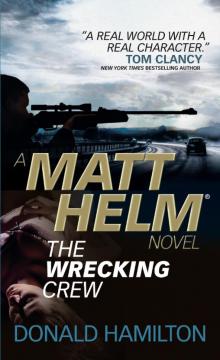 The Wrecking Crew
The Wrecking Crew The Devastators mh-9
The Devastators mh-9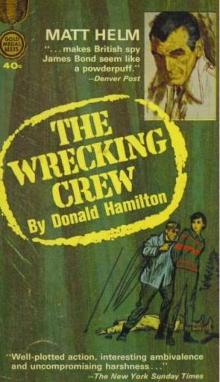 The Wrecking Crew mh-2
The Wrecking Crew mh-2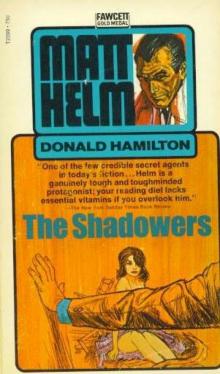 The Shadowers mh-7
The Shadowers mh-7 The Ambushers mh-6
The Ambushers mh-6 The Betrayers
The Betrayers The Terrorizers
The Terrorizers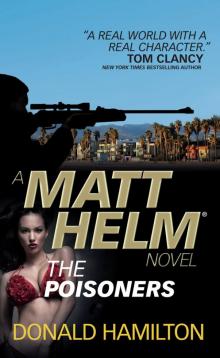 The Poisoners
The Poisoners The Devastators
The Devastators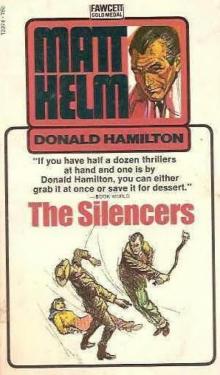 The Silencers mh-5
The Silencers mh-5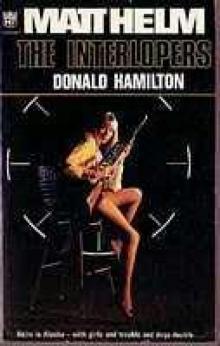 The Interlopers mh-12
The Interlopers mh-12 The Shadowers
The Shadowers The Annihilators
The Annihilators The Vanishers
The Vanishers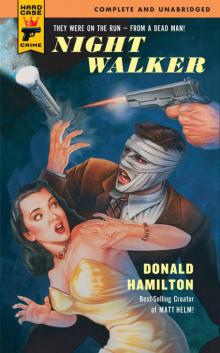 Night Walker
Night Walker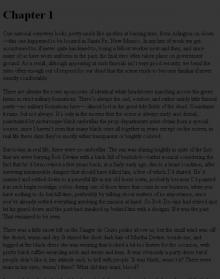 The Revengers
The Revengers The Frighteners
The Frighteners The Infiltrators
The Infiltrators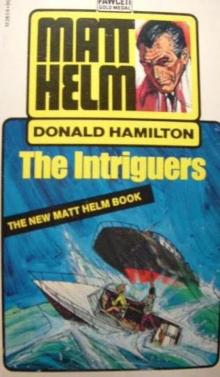 The Intriguers mh-14
The Intriguers mh-14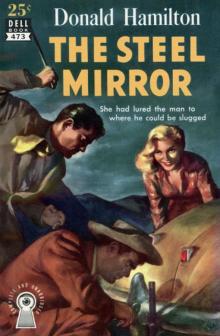 The Steel Mirror
The Steel Mirror The Menacers
The Menacers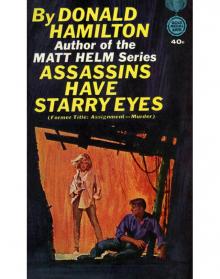 Assassins Have Starry Eyes
Assassins Have Starry Eyes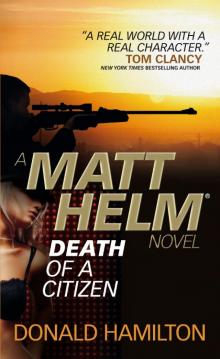 Death of a Citizen
Death of a Citizen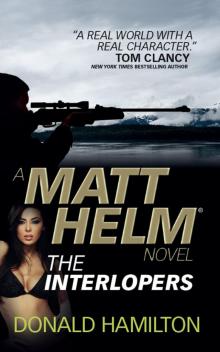 Matt Helm--The Interlopers
Matt Helm--The Interlopers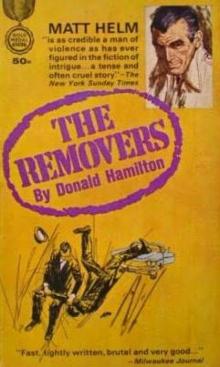 The Removers mh-3
The Removers mh-3 The Demolishers
The Demolishers Murder Twice Told
Murder Twice Told The Poisoners mh-13
The Poisoners mh-13 The Ambushers
The Ambushers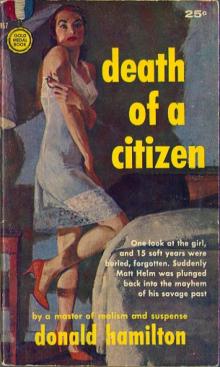 Death of a Citizen mh-1
Death of a Citizen mh-1 The Silencers
The Silencers The Removers
The Removers The Intimidators
The Intimidators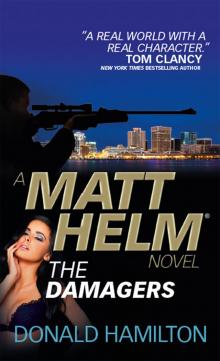 The Damagers
The Damagers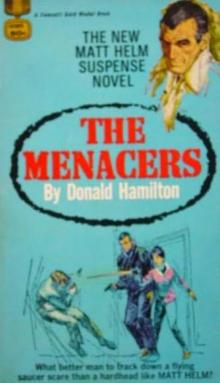 The Menacers mh-11
The Menacers mh-11 The Retaliators
The Retaliators Murderers' Row
Murderers' Row The Ravagers
The Ravagers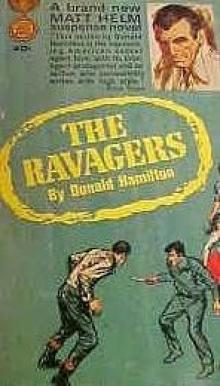 The Ravagers mh-8
The Ravagers mh-8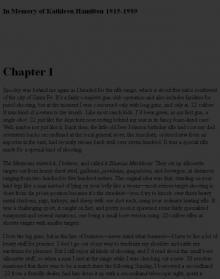 The Threateners
The Threateners The Betrayers mh-10
The Betrayers mh-10